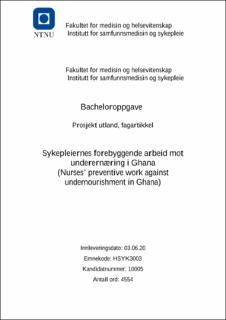Sykepleiernes forebyggende arbeid mot underernæring i Ghana.
Abstract
Introduksjon: Underernæring er et utbredt helseproblem, både globalt, og i Ghana. Sykepleieren står i en unik posisjon til å kartlegge og forebygge underernæring, og det finnes allerede godt etablerte programmer for å hjelpe sykepleieren med dette. Studien er en del av et utvekslingsopphold i Ghana, gjennom et samarbeid mellom sykepleieutdanningen ved NTNU og University of Ghana.
Metode: Data ble hentet inn gjennom kvalitative observasjoner utført ved avdelingen CWC på en helsestasjon i Accra. Materialet består av syv observasjoner av sykepleiere. Observasjonene omhandler hvordan de arbeider for å kartlegge og forebygge ytterligere underernæring hos barn i Ghana. Dataen ble senere nedfelt på PC og analysert etter inspirasjon av metode av Graneheim og Lundman.
Resultat: Resultatene viser at GMP er et godt innarbeidet kartleggingsprogram i Ghana, som fanger opp en betydelig andel av befolkningen. Det kom likevel frem ulike utfordringer sykepleieren møter i sin arbeidshverdag, som stort frafall fra programmet, kunnskapsmangel og påvirkning av ytre faktorer.
Konklusjon: Med bakgrunn i observasjoner, eksisterende empiri og litteratur kommer det tydelig frem at det er et godt grunnlag for det forebyggende arbeidet i Ghana, men at det er rom for forbedringer. Det trengs mer forskning på området, særlig rettet mot effekten av sykepleiernes forebyggende arbeid. Introduction: Undernourishment is an extensive health problem, both globally, and in Ghana. Nurses are in a unique position to prevent undernourishment and do screenings. There is an existing program in Ghana to help the nurses with this. This study is a part of an exchange program between the nursing school at NTNU and the University of Ghana.
Method: The data were gathered trough qualitative observations at a CWC at a local health station in Ghana. The material consists of seven observations, looking at how nurses do their preventive and screening work. The data were later transcribed over on the computer and analyzed by inspiration of Graneheim and Lundman’s method.
Results: The results show that GMP is an established screening program in Ghana, that covers a significant part of the population. There are, however, some challenges related to a loss of participants finishing the program, lack of knowledge and influence on the nurses work by external factors.
Conclusion: From the combination of observations, existing empiricism and literature it is clear that there is a good foundation for the nurses’ preventive work in Ghana, but there is room for improvement. There is need for more research on the subject, particularly targeting the effect the preventive work has.
